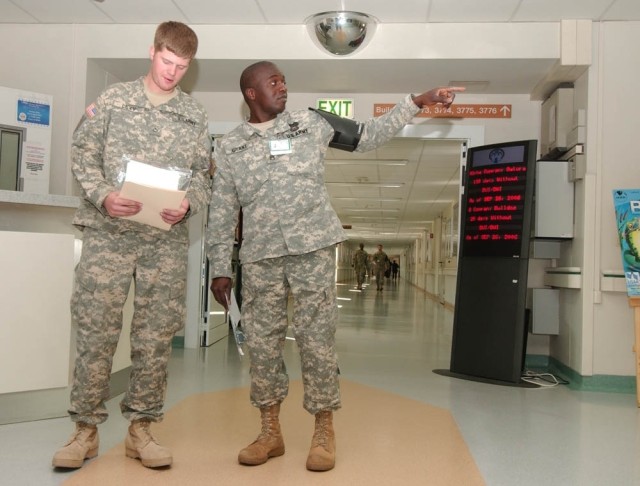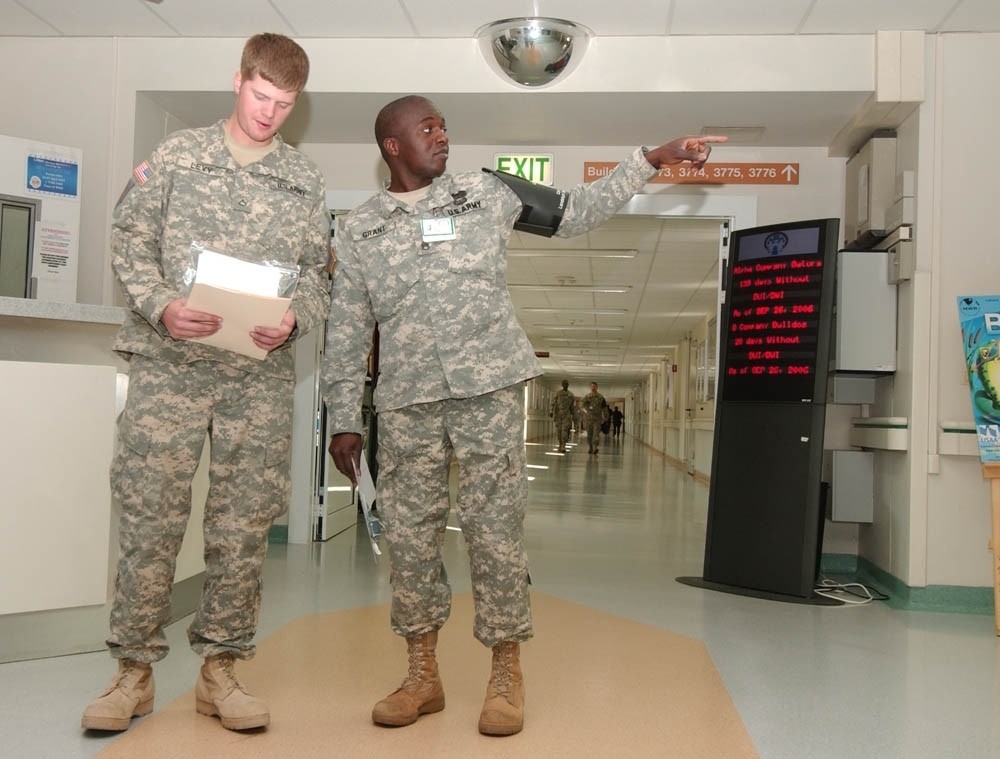
LANDSTUHL, Germany - Soldiers have their battle buddies. Airmen have their wingmen. Sailors have their shipmates.
At U.S. Army, Europe's Landstuhl Regional Medical Center, wounded warriors have their Unit Liaison Officers.
LRMC's LNOs over watch the warrior starting from the day before the patient's medical evacuation from downrange.
LNOs are some of the first people greeting a patient when he arrives via an ambulance bus from Ramstein Air Base and the LNO is the one of the last persons he will see before moving on to receive specialized treatment in the United States or upon his return to his unit in Iraq or Afghanistan.
"The LNO is the glue between the patient and the unit and is an advocate for the patient in the hospital," said senior Army LNO, Sgt. Maj. James Croft. "They are the guys on the ground with the same unit patch."
LNOs are assigned to Landstuhl by their units. In addition to the unit representatives, there are LNOs from the U.S. Army Reserve, Army National Guard and the Human Resources Command in Washington, D.C.
There are 25 Army, 10 Marine, two Navy and one Air Force unit representatives assigned to the hospital, he said. The Canadian Forces have two LNOs and the British Army has a Soldier looking out for his country's wounded.
The advocates are selected for their maturity, ability to deal with difficult situations, skills with dealing with people and clerical expertise, Croft said.
"Everything is moving and he (the LNO) is the guy in the middle," Croft said.
LNOs' workloads increase and decrease in synchronization with events taking place downrange, he said.
"You can watch our patient flow by watching TV," Croft said. "We watch the news very closely."
Combat engineers are not known for their cheerfulness.
Staff Sgt. Darold Grant, 9th Engineer Battalion, 2nd Brigade Combat Team, 1st Infantry Division, said a pleasant disposition it is major part of his job.
"When guys from 1st ID come in and see my patch, they are pretty much put at ease," he said. "It's good to see a friendly face."
During his tenure as the 1st Infantry and the 1st Armored Divisions' LNO, Grant has assisted more than 500 Soldiers.
LNOs are advocates, travel guides, executive assistants, finance and personnel clerks, baggage handlers and friends, Grant said.
Their duties include meeting basic administrative needs such as ensuring that the patient has an identification card. They collect and secure rucksacks and duffel bags. LNOs tell the patients which clinic to go to for treatment and what time to be there. They introduce the patient to his or her case manager.
In their travel agent role, LNOs make sure that their charges know how to get to and from the outpatient barracks at Kleber Kaserne in Kaiserslautern. They host clothes shopping excursions to the Ramstein Air Base Exchange where the warriors purchase civilian attire for their off-duty time.
Most importantly, Grant said, LNOs makes sure the patient understands his responsibilities and follows the hospital's rules.
"I give them a copy of the SOP (standard operating procedure) we use here and I make them sign it so there are no misunderstandings," he said. "Most Soldiers do the right thing and everything goes smoothly."
Once the patient is assigned to a ward or begins receiving outpatient treatment, LNOs report the Soldier's status and condition to the unit's forward and rear detachment headquarters.
Grant will also help arrange for unit members to visit their wounded comrades.
USAREUR Soldiers frequently undergo outpatient treatments at LRMC, sometimes staying at their home stations between appointments.
Occasionally, Schweinfurt-based family members will stay in one of the Landstuhl Fisher Houses and Grant will ensure that arrangements for their stay are made. He will also arrange accommodations for stateside family members.
Sometimes Soldiers just want someone to talk with and they frequently have many questions, Grant said.
"Even on days when I do not have patients coming off the plane, I stay in the hospital all day to take care of my inpatients and outpatients," Grant said.
Grant said he makes frequent visits to the wards and the outpatient barracks. He will continuously review patients' records and let the units know about their day-to-day status.
He will remind patients of their treatment appointments. He will ensure they know where to go and when to be there.
"Make sure you check on your patients every day. Take care of your Soldiers - take care of your patients," Grant said. "When you go to work in the morning until when you go home at night, they should be your priority."
Since they represent the patient and the unit, LNOs pretty much have the run of the hospital, Grant said. The LNO will ask the staff about the patient's condition, get a prognosis for the unit or tell nurse or doctor about a Soldier's concerns about his treatment or about the people treating him.
"You can pretty much go into any ward, any clinic and ask a question and nobody will turn you away," he sad. "Everyone in the hospital respects the LNOs because we have a tough job."
Likewise, the hospital's staff will turn to the LNO with questions about a patient or back brief him about the treatment.
Grant said his LNO duties are very different from his combat engineer's role. However, his most important responsibilities as a Soldier and noncommissioned officer remain the same:
"It's all about taking care of Soldiers and taking care of families," he said. "It's about having them go back to their units and saying that they were well taken of care in the hospital. It's making sure these patients are happy, smiling and doing well."
(Dave Melancon is a member of the U.S. Army Garrison Heidelberg, Germany, public affairs office)

Social Sharing